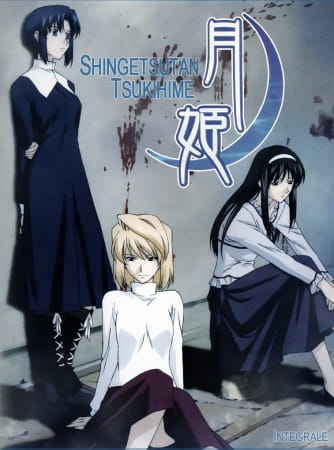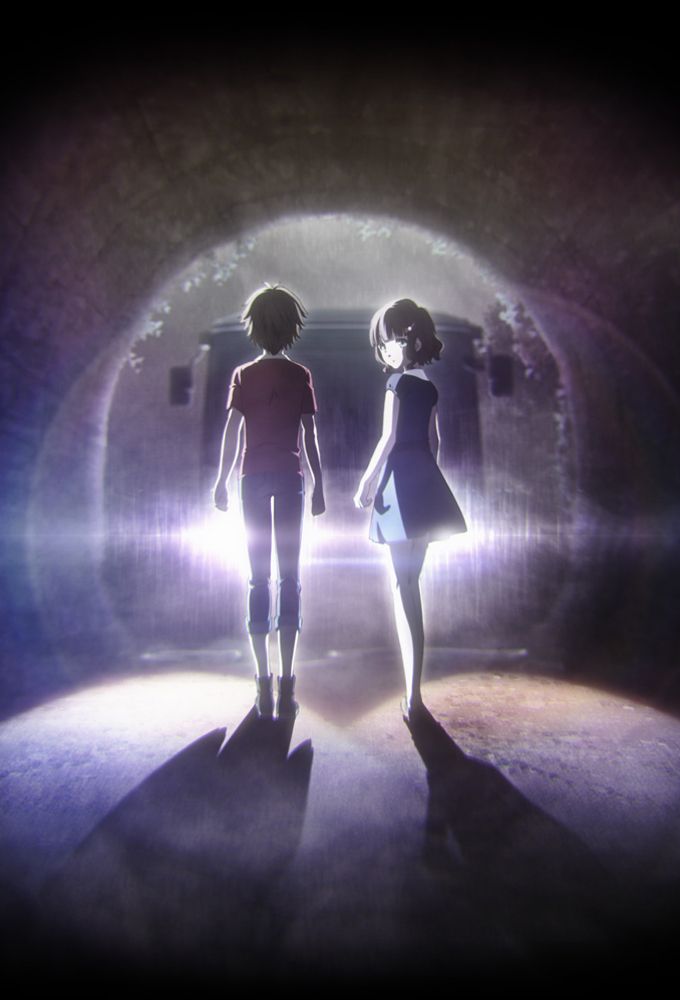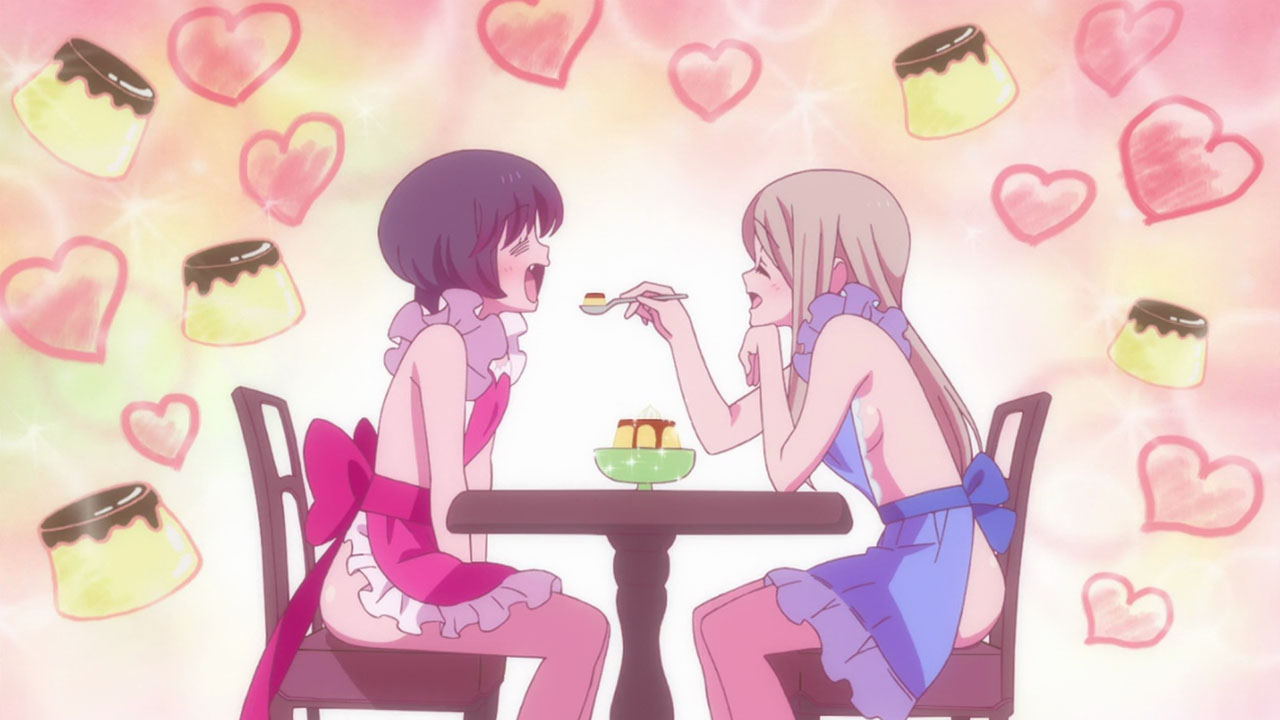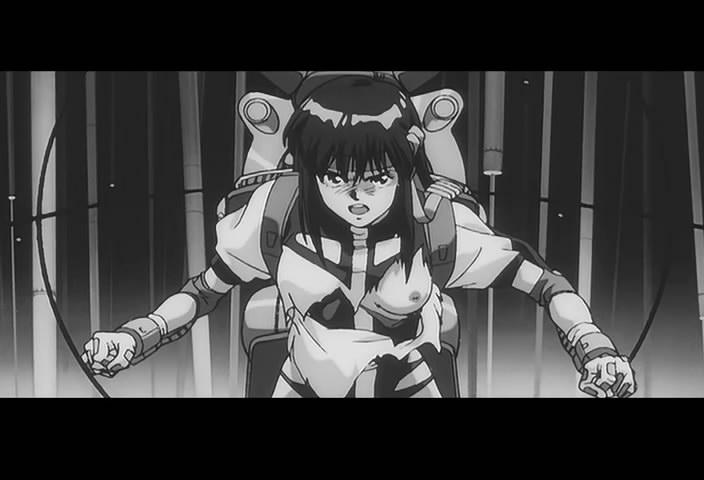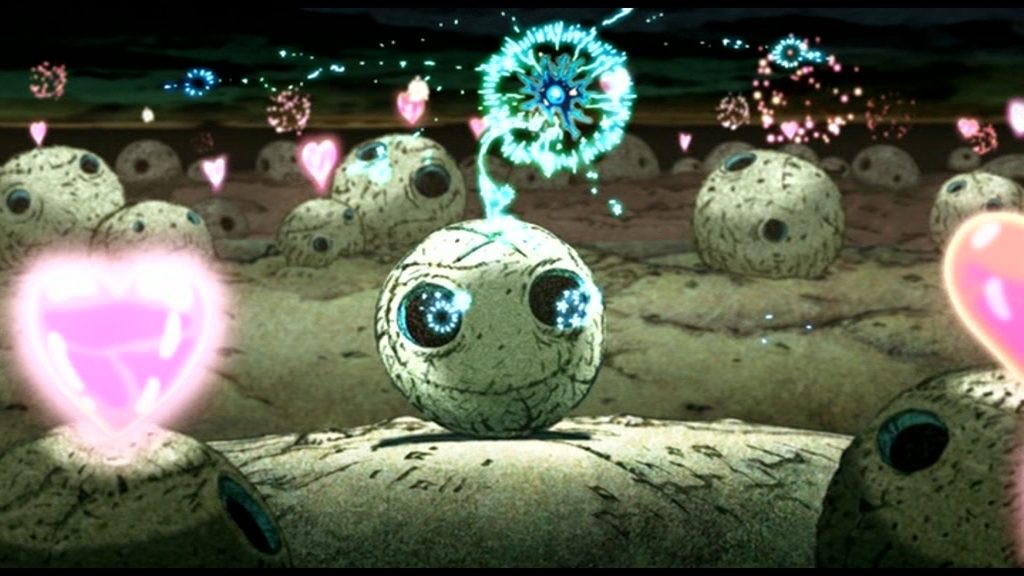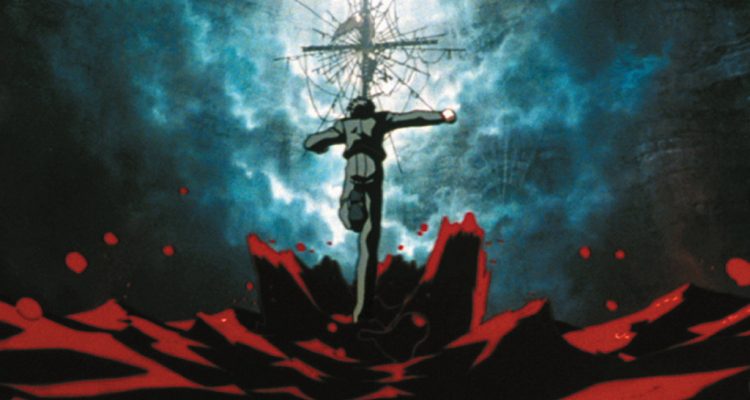Director: Katsushi Sakurabi
Screenplay: Hiroko Tokita
Based on the Visual Novel by Type-Moon
Voice Cast: Hitomi Nabatame as
Arcueid Brunestud; Kenichi Suzumura as Shiki Tohno; Akiko Kimura as Aoko Aozaki;
Fumiko Orikasa as Ciel; Hiroyuki Yoshino as Roa; Kana Ueda as Kohaku; Kaori
Tanaka as Satsuki Yumizuka; Kenta Miyake as Nero Chaos; Shizuka Itou as Akiha
Tohno; Takahiro Sakurai as Arihiko Inui; Yumi Kakazu as Hisui
Viewed in Japanese with English Subtitles
Tsukihime when the opening credits animation started - what with
falling maidens, falling figurines into blood wine filled glasses, and an air
of sombreness suggesting something earnest scored to effectively Japanese Goth Enya - had my attention already. I had
low expectations, but the interesting factor that I also had to consider is
that Tsukihime is a Type-Moon adaptation. They are a company
who originated from Dojin soft groups, hobbyists who created their own
videogames, who then grew to be a cult organisation whose work has been adaptive
into a lot of anime, a particularly significant force as the Fate series became one of the biggest
franchises in the 2010s with all the prequels, sequels and spin-offs it's had.
Tsukiime was a visual novel too, actually an adult one with
explicit sex scenes originally, which is a concept of story based videogames
which are largely text based with images (maybe animation) where the decisions
in text and dialogue choices sprawl out into multiple paths1.
Interestingly even the adult background for this particular one, which was very
successful for Type-Moon in 2000 when
it was released, was even nodded to in one of this show's good moments, that
when anime romance can be notoriously about just looking shyly to each other
and little else over a season, there are two characters here who actually consummate
theirs physically even if off-screen. Tsuhihime's
interlocking nature with other Type-Moon
titles was also another big factor for me as one particularly detail, that our
meek male high school student lead has the "Mystic Eyes of Death
Perception", immediately standing out as being carried over to The Garden of Sinners (2007-2010),
originally an older title created by the company's co-founder and light novelist
Kinoko Nasu. That was a theatrical
film serial work based on a premise of a female character called "Shiki
Roygi", Shiki also the name of our lead here, who gains the Mystic Eyes of
Death Perception after a near death experience, able to see the lines and
points on objects and living figures that went attacked destroy/maim/kill them.
Type-Moon as a company is like Marvel and DC comics, where their titles interlocking in one giant world, so I
was expecting a bit more than I got.
As a huge fan of The Garden of Sinners series, which
does present the flaws I will get into here but overcome them into a visually
stunning and narratively bold creation, I was brought to Tsukihime with some interest, which is a vampire story which
probably hides lore I have no idea about not following Type-Moon titles, but I was willingly to go along with. Said plot
follows Shiki Tohno, who gets into the curious scenario, more weird and
questionable the longer you actually think about it, of using his mystical eyes
to abruptly cut a female foreign woman to pieces, really tiny pieces, only for
her to reconstitute baring some injury and proclaim herself Arcueid the
vampire, who wants his help to find another responsible for disappearances in
the city. That they fall in love, despite his cutting her up to bits, is a
logic gap I don't know if anyone else has had, considering Tsukihime is an obscure title nowadays that was swallowed up the Geneon USA close down2. It definitely
makes things potential problematic or surreal.
Apparently being shredded to
pieces appealed to Arcueid, able to walk in the day light without issue and
able to eat regular food, a vampire who detests drinking blood, as Tsukihime becomes more of a melodrama
than a horror film, something I have to confess was a more intriguing scenario.
Shiki's sister Akiha, aloof with her regal nature, and with a household with
twin maids and curfew rules, has secrets about their family; his high school
friend Satsuki is attracted to him but is left on the side due to Arcueid's
existence; and his senior class mate Ciel, who is really good at tea
ceremonies, is secretly a church warrior after vampires. If it all has a
slightly absurd air in these ordinary environments for all this to transpire,
then this is just traditional in anime to have high schools full of secret
Vatican agents and super powered figures who still have to sleep and go about
at quiet passages of time.
The result is very conventional
meat and potatoes plotting, but it would still work. The only idiosyncrasy is
that, able to be watched without any other context, Type-Moon still like creating a barrel full of terms and dropping
them on viewers. This was negated by The
Garden of Sinners, who dialogue could be very peculiar at times, because it
lived up to being a hyper violent, hyper emotive tale of dark fantasy willing
to get its hands dirty in full blown horror whilst having enough time to have
interesting characters and be experimental, like an epilogue which is just
thirty or so minutes of characters talking each other on a snowy road. Tsukihime is bit by the fact it has to
be a twelve episode TV series with an end, which is waylaid by the lore. Apparently,
Arcueid is of the "Moon People" for example of some of this
exposition dropped out of nowhere. That particular example just evokes to me
(maybe completely misinformed) another example of anime being obsessed with
vampires being from outer space and near it, something probably informed by the
fact Japan doesn't have a natural vampiric lore, so come to this literal
foreign import to the point of shooting them out of space at themselves. Other examples
of terminology just get lost or forgotten for me.
The conflict in being the
melodrama and the horror action show weighed down by this lore is the real
issue that takes over. Its why the best episode of the entire series, enough I
admit a fondness to what was an utterly failed anime series, was the episode where
all the main cast, including Shiki's best male friend and goofball, go to a
theme park for the entire twenty plus minute length. Where Akiha is openly
antagonistic to Ciel from the moment they meet; where Ciel and Arcueid briefly
have a ceasefire from being vampire and holy warrior, riding the same Ferris wheel
cart together pondering why Akiha is as odd as she is; Satsuki as the maligned
girl who, possessing a magnificent set of giant twin ponytails but utterly
timid aside from this, finally shows some strength in the midst of a lunch time
argument to chew everyone else out for stressing Shiki out with their arguments.
It's the likes of this type of episode where the reward of anime comes from,
where even a show that could be seen as bland and convoluted at one moment
redeems itself, all by dragging high concept stories into curious little dramas
and details.
The series beyond it however is
flat, handicapped in being too short for its ambition, and not pacing itself
well. Barring one minion who can produce flesh eating wolves from himself,
causing an entire hotel's worth of carnage3, the suggestion that
this show would be a traditional action-horror doesn't happen but is a
structure the show is stuck with nonetheless. A huge factor, even with my lack
of knowledge of the source material, is knowing the visual novel is cut into multiple
different story arches, the various layers a visual novel can possess (and with
the time to tell them) difficult to reproduce in just, say, twelve episodes.
(There's an entire story beat, from that source material, just on Shiki being
locked in his bedroom and going mad, which might've been a fascinating tangent
if this was a considerably longer production). Frankly, and this might be a controversial
choice, I'd wished the melodrama had entirely taken over the show, as all the over
elaborate exposition is a distraction. As a result, Tsukihime does have a flat ending, pushed with the sense (felt as I
have done with these shorter series) that the production was forced to have the
escalated, action orientated finales.
In terms of a production, from
the early 2000s, its looks to be polite merely okay and frankly not as splendid
as it should've been, more so in knowledge that the creators, J.C.Staff, have got some highly regarded
work in their CV from Revolutionary Girl
Utena (1997) to the Food Wars!: Shokugeki no Soma franchise.
The rudimentary, okay look really doesn't add as much dramatic heft as you want
to make the show as emotional as it clearly wants to be. It also has the issue
that its protagonist Shiki is violently meek to the point he's not a character
you can get a lot of drama from most of the time unlike his co-stars. This has
gotten to the point, even commented on in the show by his male friend, that
this characterisation of affability that is extreme passive feels less like an
annoying characterisation for so many anime male protagonists but a cultural
concept, (quiet, affable, potentially passive to the lack of propulsion), that
I suspect is a subconsciously drawn from real life. It also argues for my
theory of you are likely to have more dynamic female characters, even if its
objectified, just by how elaborate Satsuki's hair is before you even give her a
little plot by herself, when too many times the male cast can be between
average Joe as here or average grizzled cool badass.
The use of vampire lore is also
worthy of mention as, because Japan doesn't have a folklore, the show innately
has a European aesthetic draped over a habit I love in Japanese horror, of
these types of events taking place in the most ordinary of Japanese
environments, be it the countryside or city streets, even here next to convenience
store and drinks machines. For all the flaws I can level at Tsukihime, letting the character of Arcueid
be a vampire who gets to play in an arcade and even watch a vampire film, in
the traditional Bela Lugosi look on
the poster, is a lot fascinating for me than the generic action horror it
eventually returns to, even going to the amusing moment of Arcueid offering the
amateur film criticism about the pleasures of fake stories, as someone yet to
go to one after maybe hundreds of years of existence, strangely making this
amateur review blog's day for that scene
too.
People who love the original
visual novel would probably hate this adaptation because it's so cut down and
reduced, limited in visual style and aesthetic, but subjectively even I, who
didn't really leave with high thoughts on the show, can still skim the thought
out that, for what is ultimately an average show, it had quirks. I had a show
more inclined in suggesting how, because she still has to pay for hotels to
stay in, Arcueid has even made counterfeit money to Shiki's mortification,
something I was grateful for than any of the average looking fight scenes that occasionally
appear. As someone, aware that the gender politics are problematic, who
actually thought the idea of the Twilight
series as a melodramatic romance with Universal
horror monsters was brilliant as a premise, who even found amusing to the idea
of vampires playing baseball in that first film as part of its charm, it was
more the fact that it became generic CGI fight scenes and lore that really
irritated me if you stuck to just its storytelling. A vampire tale which is
less action more drama, no matter how potentially syrupy, is more worthy of interest
for me and was the more interesting parts of this particular series.
Tsukihime however has to try to be more dramatic than this, which
doesn't interest as much as the little moments. The series leads to tragedy and
surprises - secret siblings, Akiha being cagey for good reason because her hair
turns blood red and glowing if uncontrolled, a cell inexplicably appearing and evoking
H.P. Lovecraft's The Rats in the Walls in a cameo, all to a tragic conclusion to a
romance that's bittersweet - but the pace was badly planned. Its slow burn tone
for eight episodes, building evil henchmen and a being named Roa who is revealed
to be responsible for vampires in the first place, but when there are only
twelve episodes only, its hastily concluded and all rushed in the end. It's a
shame as a fascinating genre hybrid between romance and horror and drama, it
has its moments, only to collapse as it does.
=======
1) School Days (2007), once you get past its bland aesthetic look and occasionally
leering eye, was an inspiring example of a show based on a visual novel where
the worse possible ending, bad decisions and even death, was played out in gut
wrenching detail.
2) Geneon, a Japanese production company, set up shop in the United
States as Geneon USA and, whilst they
released titles that were relicensed like Black
Lagoon (2006) and Hellsing Ultimate
(2006-2012), dragged many titles into out of print when they couldn't
survive that market. Admittedly, a lot of them weren't released in the United
Kingdom, so the likes of the notoriously awful Genma Wars (2002) series might be difficult to see let alone come
to try to paint a picture of the company's personality like others.
3) If this had the carte blanche
of The Garden of Sinners, trust me they
wouldn't have held back on the horrors of that massacre, whilst what you get
here is cut away from for TV standards.
